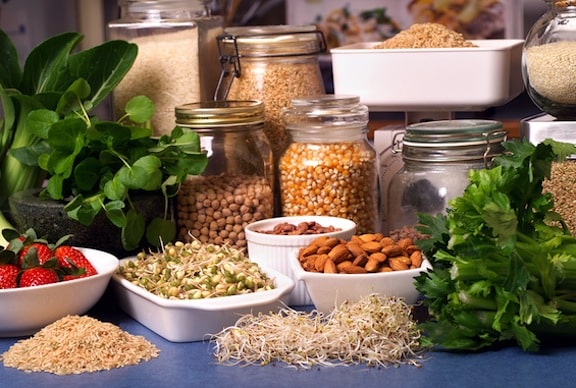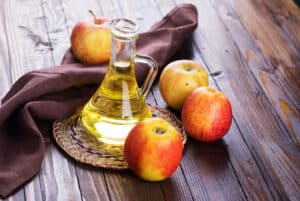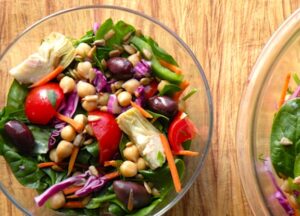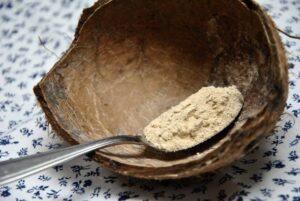What is a vegan diet, and how is it different from a vegetarian diet? Sometimes called a plant-based diet, vegans avoid all animal products in the diet, including eggs, dairy product, and even honey. Vegetarians avoid meat, fowl, and seafood; For most vegans, ethical factors weigh in equally, if not more so, as health and environmental issues. Concerns for animal welfare and the embracing of a more compassionate lifestyle means that many vegans won’t wear leather or wool. In general, any products that are animal-derived or that contain animal byproducts are avoided.
Before going vegan, I worried that family meals might be impossibly restrictive, but making the transition for home cooking was surprisingly easy. With the variety of nondairy cheeses and milks so readily available, we can still enjoy favorite recipes. The bottom line, though, is that eating vegan is not just about substituting one kind of cheese for another so that you can still have pizza.
The optimal vegan diet, like any ideal diet, is abundant with fresh organic fruits and vegetables, including plenty of leafy greens, whole grains, beans and other legumes, nuts, and seeds. Even if you have no intention of going vegan yourself, anyone can benefit from enjoying a completely plant-based meal from time to time. You’ll be pleasantly surprised by how hearty and satisfying it can be.
RESOURCES, BOOKS, AND TIPS FOR EXPLORING A VEGAN DIET
VegKitchen offers other articles with helpful information:
- Vegan Substitutions Guide
- Great Reasons to Go Vegan
- Planning Healthy Vegan Diets
- Vegetarian / Vegan Nutrition for Teenagers
- Protein for Plant-Based Diets
According to Brenda Davis, R.D., and Vesanto Melina, M.S., R.D., authors of Becoming Vegan,* “The vast majority of studies assessing the dietary intakes and nutritional status of vegans reassure us that well-planned vegan diets can supply adequate nutrition...It is important to recognize, however, that as with nonvegetarian or lacto-ovo vegetarian diets, vegan diets can be both adequate and inadequate.” The most important first step in going vegan is to seek reliable information, read, and learn.
FURTHER RESOURCES
- Good books to start with for learning how to go vegan healthfully are the aforementioned Becoming Vegan* as well as Vegan for Life*, Living Vegan For Dummies*, The Ultimate Vegan Guide*, The Complete Idiot's Guide to Plant-Based Nutrition*, and The Complete Idiot's Guide to Vegan Living*.
- Explore vegan cookbooks for ideas on creating delicious meals. My books are known for their easy recipes using readily available ingredients. Also, explore VegKitchen's vegan cookbook reviews.
- The Vegetarian Resource Group is one of the web’s premier destination for all things vegan, including articles on nutritional needs from infancy to adulthood. Request their brochure, Vegan Diets in a Nutshell, which encapsulates ways to obtain protein, calcium, zinc, iron, and vitamins D and B12. Becoming a member of VRG entitles you to Vegetarian Journal, a quarterly publication of vegan nutrition, ethics, and recipes.
- Explore large natural foods stores and well-stocked supermarket to learn about products suited to the vegan diet. Nondairy alternatives are often side-by-side with conventional dairy products and there you’ll find nondairy milks, cheeses, yogurts and even coffee creamer. Butter is easily replaced with non hydrogenated margarine, or better yet, Earth Balance. Or, just use olive oil more often. Try making your favorite recipes using some of these vegan substitutes.
- The best way to go vegan is gradually. If that’s your goal, segue gently from a lacto-ovo vegetarian diet. Many people give up eggs first, then milk. Cheese is often last to go. Eat only plant-based foods once a week at first to see how you—and your palate—react. If it suits you, add another plant-based day per week for a while, then make the complete switch when you feel ready.
- For lots more features on healthy lifestyle, please explore VegKitchen’s Healthy Vegan Kitchen page.
*This post contains affiliate links. If the product is purchased by linking through this review, VegKitchen receives a modest commission, which helps maintain our site and helps it to continue growing!







my home says
Their concern is primarily to "look good" or "stay thin" or "build muscles".
Angelo - What is a Vegetarian says
For many people (I was included) change from omnivore to vegan is a very hdifficult journey. It might depend of your personality but in my case I took almost 1 year to become a 100% vegan. I decided to start a very slow progression, the first weeks I was flexitarian then I become vegetarian and then vegan. This very slow approach works for me. In my case, I'm sure if I would make an abrupt change, I would failed.
Very nice article specially the books section
velama sudhakar Rao says
It is well known,experienced,the vegetarian food diet is best for easy digestion,for easy conversion to the system of body in all the ways.The salad is important menu in this food.All are aware what system of digestion is in our body,what benefits to our body,what shall be benefitting to all our brain to keep active,body active/smart,good physic,glow on face,positive thinking,total optimisam in personality,good at decision making,quest for learning,more n more patience in handling/solving any subject matters,loving towards lovely family,lovely children,service orientation helping others,sacrificing for good cause,develops all in all as a best human with humanity,with kindness n intelligence creativity/innovational n what not. . . . more. . . . . .more . . . FOR NOBLE CAUSE.